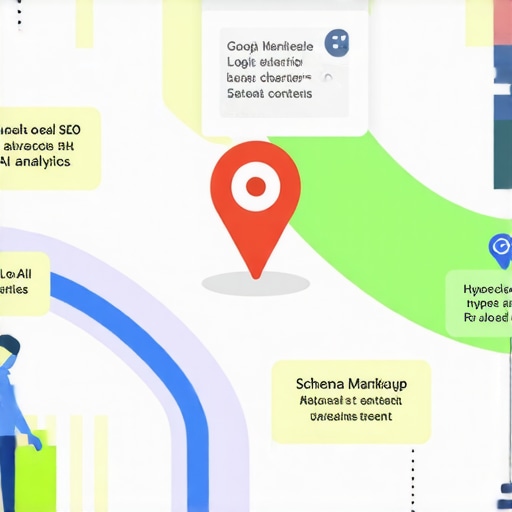Unlocking the Future of Local Search: Mastering Google Maps Visibility with Proven SEO Techniques
In an era where digital presence directly impacts local business success, understanding the intricacies of Google Maps SEO in 2024 is paramount. This guide synthesizes expert insights and cutting-edge strategies to bolster your local ranking, leveraging nuanced algorithmic understanding and advanced optimization methods.
The Core of Maps SEO: Beyond Basic Optimization
How can businesses leverage semantic SEO to dominate Google Maps rankings?
Semantic SEO involves optimizing content with contextually relevant keywords and related topics, enhancing relevance signals for Google’s local algorithm. By integrating LSI keywords such as “local business SEO,” “Google My Business optimization,” and “local search ranking factors,” you create a rich, interconnected content ecosystem that signals authority. For instance, updating your Maps SEO strategies ensures your listings align with evolving algorithmic preferences.
Technical Foundations: Structuring Your Local Presence for Algorithmic Success
Technical SEO for local involves schema markup, mobile optimization, and citation consistency. Implementing structured data with localBusiness schema enhances your rich snippets, directly influencing click-through rates and ranking. Moreover, maintaining NAP (Name, Address, Phone Number) consistency across directories fortifies trust signals, a crucial factor in Google’s local algorithm.
Advanced Tactics for Maps Optimization: From Citations to User Engagement
Optimizing citations and reviews remains vital. However, in 2024, focus shifts toward review diversity and engagement metrics. Encouraging authentic reviews from varied customer segments enhances profile credibility. Additionally, leveraging local backlinks from authoritative sources, such as local chambers of commerce or industry associations, can significantly boost your authority in the local ecosystem.
Emerging Trends and Future Challenges in Google Maps SEO
Emerging trends include AI-driven personalization and voice search integration. Preparing for these involves creating content that supports voice queries and optimizing for conversational keywords. As Google continues refining its local search algorithms, staying ahead demands continuous monitoring of ranking signals and adapting strategies accordingly.
What are the most effective ways to measure and analyze local SEO performance for Google Maps?
Utilize tools like Google Search Console, Google Business Profile insights, and third-party analytics platforms to monitor keyword rankings, profile engagement, and review metrics. Regular audits help identify gaps and inform iterative improvements, ensuring your local SEO strategy remains effective and adaptable.
For further insights into mastering local search, explore our comprehensive Maps SEO techniques. To deepen your understanding of technical optimization, consider reviewing authoritative resources such as Google’s official schema markup guidelines.
Engaging with a community of SEO experts and sharing your insights can foster innovative approaches and keep your strategies at the forefront of local search evolution.
Harnessing the Power of Local Content Clusters for Maps SEO Dominance
One of the most effective yet underutilized tactics in local SEO is the development of content clusters tailored specifically for your geographic area. By creating a series of interlinked pages around core topics—such as local events, community news, or industry-specific guides—you enhance topical authority and signal relevance to Google. This approach not only improves your overall visibility but also encourages longer engagement from local users, boosting your profile’s credibility.
How Can Machine Learning and Data Analytics Revolutionize Your Maps Optimization?
Emerging technologies like machine learning algorithms and advanced data analytics enable local businesses to personalize their SEO strategies dynamically. Analyzing user behavior patterns, search intent shifts, and review sentiment scores can help refine keyword targeting and review management efforts. For example, integrating AI tools can identify emerging local trends or underserved keywords, allowing you to adapt your content and outreach efforts proactively. For practical insights on leveraging these tools, explore effective SEO ranking strategies that incorporate AI-driven analytics.
Are you leveraging the full potential of local schema markup to enhance your visibility?
Implementing comprehensive schema markup, including not only localBusiness but also event, product, and review schemas, can significantly influence how your listings appear in search results. Rich snippets, enhanced with structured data, can increase click-through rates and provide users with immediate value, such as real-time reviews or event details. Ensuring your schema markup is consistently updated and correctly implemented across all online platforms is crucial for maintaining dominance in local searches.
For a deeper dive into schema strategies, see our Maps SEO techniques. Incorporating these advanced schema tactics can set your business apart from competitors relying solely on basic profile optimizations.
Optimizing for Voice Search and Conversational Queries
With the rise of voice-activated devices and virtual assistants, optimizing your Google Maps listing for voice search is more critical than ever. This involves tailoring your content to answer common questions naturally, focusing on long-tail keywords, and incorporating conversational language. For example, phrases like “Where’s the best coffee shop near me?” or “Can you recommend a local plumber in [City]?” are prevalent in voice searches. Creating FAQ sections that address these queries can dramatically improve your chances of appearing in voice search results.
To learn more about mastering voice search optimization, consult our Google visibility boost strategies.
How can you integrate user-generated content to boost your local search authority?
Encouraging customers to share their experiences through reviews, photos, and Q&A interactions not only enhances your profile’s authenticity but also signals engagement to Google. User-generated content (UGC) acts as social proof and can diversify your review profile, making it more trustworthy and appealing. Implementing strategies like review incentives, photo contests, or Q&A prompts can help organically grow this valuable content. Remember, consistent engagement with your audience fosters loyalty and improves your local search rankings.
If you’re interested in exploring more innovative local SEO tactics, don’t hesitate to share your experiences or ask questions in the comments. Also, consider reading our comprehensive top SEO ranking techniques to stay ahead of the curve.
Harnessing AI and Predictive Analytics to Refine Local Search Strategies
As artificial intelligence continues to evolve, local businesses must integrate AI-driven tools to anticipate user behavior and search trends. Predictive analytics enables marketers to identify emerging local keywords and optimize content proactively, rather than reactively. For instance, machine learning models trained on local search data can forecast shifts in consumer preferences, allowing businesses to adjust their keyword targeting and content strategies in real-time. Platforms like BrightLocal and SEMrush are increasingly incorporating AI features that facilitate such advanced analysis, providing actionable insights that can significantly boost Google Maps rankings.
Implementing Hyper-Local Content Clusters for Contextual Relevance
Creating hyper-local content that resonates deeply with specific neighborhoods, districts, or communities enhances topical authority and relevance. This involves developing detailed guides, event pages, and community news that interlink with core service pages. The granularity of this approach signals to Google a profound local expertise, improving visibility in localized searches. For example, a restaurant might create separate pages for each neighborhood it serves, enriched with local landmarks, testimonials, and event participation. Such detailed, contextually rich content fosters higher engagement and encourages local backlinks, further elevating rank.
What are the nuanced impacts of Google’s Local Pack algorithm updates on small business SEO?
Google’s Local Pack algorithm updates frequently refine how local results are ranked, emphasizing factors like user engagement signals, review sentiment analysis, and proximity accuracy. According to Moz’s Local Search Ranking Factors 2023 report, engagement metrics such as click-through rate (CTR), call clicks, and direction requests have gained increased weight. Small businesses that adapt by enhancing user experience, optimizing for voice search, and actively managing reviews can better align with these dynamic ranking signals. Staying informed through authoritative sources like Google’s official updates and industry studies is vital for maintaining competitive advantage.
Deep Dive: The Role of Structured Data in Enhancing Local Search Visibility
Structured data, especially localBusiness schema, is fundamental for rich snippets, Knowledge Panel features, and enhanced visibility in local results. Implementing comprehensive schema markup—covering hours, services, reviews, and event information—can dramatically influence how your listing appears. For example, adding review schemas with star ratings can boost your click-through rate by providing immediate social proof. Google’s Search Central provides detailed guidelines on schema implementation to ensure your structured data is correctly formatted and consistently maintained across all platforms, preventing issues that could harm your visibility.
How Can Local Link Building Strategies Evolve in the Age of AI?
Traditional link-building tactics are evolving with AI-powered outreach tools and data analysis. Businesses can leverage AI to identify high-authority local domains, analyze backlink profiles, and automate personalized outreach campaigns. Additionally, AI can help identify content gaps in local industry sectors, enabling the creation of link-worthy assets like local research reports, event sponsorships, or community initiatives. Building relationships with local influencers, chambers of commerce, and industry associations remains crucial, but now with a data-driven approach that maximizes efficiency and effectiveness.
Expert Tips: Integrating Voice Search Optimization into Local SEO Campaigns
Optimizing for voice search in 2024 demands a shift toward conversational keywords, question-based content, and featured snippet targeting. Incorporate common voice queries into your FAQ sections and use natural language to answer questions succinctly. Additionally, ensure your Google My Business profile is optimized for voice search by updating accurate business hours, contact information, and service descriptions. Voice search optimization not only captures direct voice queries but also influences your local SEO in broader ways, such as featured snippets and zero-click results, which are increasingly dominant in local search landscapes.
How does user-generated content influence local search rankings and trustworthiness?
User-generated content (UGC), including reviews, photos, and Q&A, significantly impacts local search rankings by providing fresh, authentic signals of engagement and trust. Encouraging customers to share their experiences fosters a vibrant profile that attracts more reviews and interaction, which Google interprets as a sign of active community presence. Strategies such as incentivized reviews, photo contests, and prompt responses to customer queries help cultivate UGC organically. Moreover, diverse and positive review profiles contribute to higher trustworthiness scores, ultimately boosting visibility and conversions.
For those committed to elevating their local search game, exploring advanced analytics tools and participating in industry forums can foster continuous learning and innovation. Dive deeper into our resources and stay ahead in the competitive local SEO arena by visiting our dedicated comprehensive guide to local SEO mastery.
Deciphering the Algorithmic Mysteries Behind Google Maps Rankings
As local SEO specialists seek to unlock the full potential of Google Maps, understanding the nuanced factors influencing ranking algorithms becomes paramount. Recent updates emphasize user engagement metrics, semantic relevance, and authoritative backlink profiles. Analyzing these signals with sophisticated tools such as SEMrush or BrightLocal can reveal hidden opportunities for strategic optimization.
Leveraging AI-Powered Local Keyword Research for Precision Targeting
Emerging AI-driven platforms facilitate hyper-specific keyword discovery tailored to localized search intent. By integrating natural language processing (NLP) techniques, businesses can identify long-tail queries and conversational phrases that resonate with their community. This proactive approach ensures your content aligns with evolving user behaviors, thereby elevating your Maps visibility.
What sophisticated methods exist to optimize for voice search within Google Maps?
Voice search optimization now demands a focus on natural language, question-based content, and featured snippet targeting. Incorporate detailed FAQs, structured data, and clear call-to-actions that mirror how users verbally inquire about local services. Additionally, ensure your business profile holds accurate, comprehensive data to facilitate voice assistants in delivering reliable results.

Harnessing the Power of Structured Data to Enhance Local Rich Snippets
Implementing comprehensive schema markup—beyond basic localBusiness schemas—can dramatically improve how your listings appear in search results. Embedding event, product, and review schemas enriches your listings with star ratings, event dates, and real-time reviews, which substantially increase click-through rates. Maintaining updated, correctly formatted structured data across all online platforms is crucial for sustained visibility.
Deep Dive: Building Hyper-Local Content Clusters for Authority and Engagement
Developing interconnected content clusters centered around specific neighborhoods, landmarks, or community activities signals deep local expertise to Google. This approach not only boosts topical relevance but also encourages backlinks from local media, blogs, and community organizations. Consider creating detailed guides, local news updates, and event pages that interlink with core service pages, fostering higher user engagement and trust.
How can predictive analytics revolutionize your local SEO campaigns?
Utilizing AI-powered predictive analytics enables marketers to anticipate shifts in search trends, consumer preferences, and review sentiment. By analyzing historical data and real-time signals, businesses can proactively optimize keywords, adapt content strategies, and allocate resources more effectively. Platforms like SEMrush and Moz are integrating such features, empowering data-driven decision-making for local search dominance.
Are you optimizing your Google My Business profile with advanced schema markup to maximize visibility?
Enhanced schema markup, including event, product, and review schemas, can significantly elevate your local search presence. Rich snippets with star ratings, event details, or product information provide immediate value to users and improve CTR. Ensure your structured data is consistently updated and correctly implemented according to Google’s guidelines, as this can be a decisive factor in outranking competitors.
Explore Google’s official schema markup guidelines for comprehensive best practices and stay ahead in the competitive local landscape.
Optimizing for the Future: The Impact of AI and Machine Learning on Local Search
The integration of AI and machine learning into local SEO strategies enables businesses to analyze user behavior, review sentiment, and search intent at an unprecedented scale. These insights allow for dynamic content adjustments, personalized outreach, and smarter ad targeting. Platforms offering AI-driven analytics, such as BrightLocal, facilitate continuous optimization, ensuring your Google Maps listing remains competitive amidst evolving algorithms.
Creating Ultra-Localized Content to Capture Niche Markets
Focusing on hyper-local content tailored to specific neighborhoods or community interests can establish your authority and foster deep local engagement. Incorporate local landmarks, community events, and neighborhood-specific testimonials to create a rich, relevant experience for users. This granular approach signals to Google your profound local expertise and can generate valuable backlinks from local sources, further boosting your rankings.
What are the latest developments in Google’s Local Pack algorithm, and how should businesses adapt?
Recent updates emphasize real-time user engagement signals, review diversity, and proximity accuracy. According to Moz’s 2023 Local Search Ranking Factors, optimizing for these signals involves actively managing reviews, enhancing user experience, and ensuring precise business location data. Staying informed through official Google updates and industry studies enables businesses to adapt swiftly and maintain a competitive edge.
Deepening Your Local SEO Strategy with Predictive User Behavior Modeling
Predictive modeling leverages machine learning to forecast user search patterns and preferences, allowing for proactive content and keyword optimization. By integrating data from tools like BrightLocal and SEMrush, you can identify emerging local trends, underserved keywords, and review sentiment shifts, adapting your strategy before competitors react. This forward-thinking approach ensures sustained visibility in Google Maps rankings.
How can you effectively utilize user-generated content to bolster local search authority?
Encouraging authentic reviews, photos, and Q&A interactions enhances your profile’s credibility and signals active community engagement. Strategies include incentivized reviews, community events, and prompt responses to customer feedback. This UGC diversity not only improves your local relevance but also positively influences Google’s trust signals, leading to higher rankings and increased consumer trust. Regularly refreshing your profile with new user content sustains ongoing engagement and search relevance.
To further refine your local SEO tactics, consider participating in industry forums and following authoritative sources like Google’s official updates. Staying ahead requires continuous learning and adaptation.
Expert Insights & Advanced Considerations
1. Emphasize Semantic SEO for Local Authority
Leveraging semantic SEO enhances relevance signals by integrating contextually related keywords, elevating your local search presence. Incorporate LSI keywords such as “local business SEO” and “Google My Business optimization” to build an interconnected content ecosystem that signals authority effectively.
2. Prioritize Technical Foundations with Structured Data
Implement comprehensive schema markup, especially localBusiness, to generate rich snippets that improve click-through rates. Ensuring NAP consistency across directories reinforces trust signals, which are critical in Google’s local algorithm.
3. Harness User Engagement and Review Diversity
Encouraging authentic, diverse reviews and fostering engagement through local backlinks from authoritative sources significantly bolster your profile credibility and rankings in 2024’s evolving landscape.
4. Prepare for Voice Search & AI Personalization
Create conversational content optimized for voice queries, and utilize AI-driven analytics to identify emerging local trends, allowing proactive strategy adjustments that keep you ahead of competitors.
5. Develop Hyper-Local Content Clusters
Build interconnected pages centered around neighborhoods, landmarks, or community events to signal deep local expertise and increase backlinks, ultimately improving topical authority and visibility.
Curated Expert Resources
- Google’s Official Schema Markup Guidelines: Essential for proper structured data implementation, ensuring rich snippets and enhanced visibility. Learn more
- Moz Local Search Ranking Factors 2023: Provides insights into what signals influence local pack rankings, especially user engagement metrics. Explore detailed analysis
- BrightLocal & SEMrush AI Features: Advanced tools for predictive analytics and keyword research, facilitating proactive local SEO strategies. Discover how to leverage AI in local SEO
Final Expert Perspective
In 2024, mastering Google Maps SEO demands a strategic blend of technical precision, authoritative content, and adaptive AI-driven insights. Emphasizing semantic relevance, structured data, and hyper-local content creates a resilient foundation for visibility and credibility. Dive deep into authoritative resources to refine your approach and stay ahead in the competitive local search arena. Engage with industry professionals, share insights, and continually adapt to algorithm shifts—your expertise and proactive strategy are the keys to local dominance. For ongoing learning, explore our comprehensive Maps SEO strategies and keep your tactics sharp.



